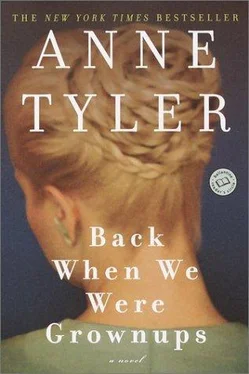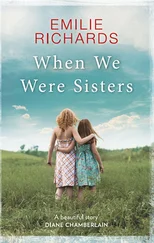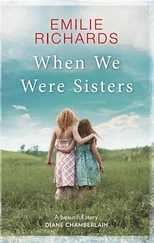“No, actually, it’s mine,” Rebecca said. This was a startling thought, for some reason. She said, “It’s how I make my money, what little of it there is. How would I make any money in Church Valley?”
“I’m sure you’d find something or other,” her mother said.
“Besides, I’ve got Poppy to think of.”
“Poppy! Is that old man still alive?”
“Of course he’s still alive. Next December he’ll be a hundred. I’m planning a gigantic hundredth-birthday party for him,” Rebecca said. Then she stopped to reflect upon the oddly boastful note that seemed to have crept into her voice.
“What I’d do,” her mother said, as if Rebecca hadn’t spoken, “is put my house in your name instead of selling it. Let you move right in. Leave you most of the furnishings, even.”
Rebecca said, “Oh, I suspect you’ll need to sell your house in order to afford the retirement home.”
“I’m not getting but a little studio unit. The least expensive model. I can pay for it out of my pension.”
She had worked for nearly thirty years in the basement of the county courthouse, keeping track of old documents. Rebecca didn’t suppose that her pension was very large. She said gently, “Thanks anyhow, Mother.”
But as they climbed the steep path on the other side of the river, approaching her aunt’s part of town, she briefly entertained a fantasy of returning here to live. She imagined her routine: each day crossing the river for her meager supply of groceries, stopping first at the library the way she used to as a child. She had been the kind of child a librarian would love, she saw now, so pale and polite and considerate, careful to check that her hands were spotless before reverently selecting yet another Louisa May Alcott book. This was in the late fifties, when other children were turning to TV, but Rebecca — pudgy even then and stodgily dressed, her father dead and her mother several years older than any of her classmates’ mothers — was not in step with most other children. She had always been the town’s Bright Girl. (“Brain” was the term they used.) She tended to stay on the fringe of things, observing from a distance, and she had noticed that what she observed was often outside the normal frame of vision. It was as if she didn’t have a frame of vision, so that during the Christmas pageant her attention might be caught by some small personal drama in the audience while everybody else was watching the stage. But she was not unhappy. She had had several friends, and in high school she’d had a boyfriend. And she was good at amusing herself when she was alone. In fact she’d been very content with things just the way they were; her set-apart position had felt comfortable, and restful.
When she grew up and left for college, the librarian gave her a going-away gift: a leather-bound blank book entitled A Reader’s Life List . But Rebecca used only the first few pages, because college was when everything changed.
College was when she met Joe.
She said, “I don’t suppose Miss Bolt still works at the library, does she?”
“Good heavens,” her mother said, “I haven’t thought of Miss Bolt in ages. I’m sure she must have passed on. Anyway, now they use volunteers, and the library isn’t open but three half-days a week.”
It was ludicrous to imagine moving back here. Rebecca didn’t know a soul.
But when she pointed that out—“See there? To me Church Valley’s all strangers”—her mother said, “Oh, piffle. You know Aunt Ida. You know the Finches. And Abbie Field and Sherry and the Nolan twins.”
“Do you still see all of them?”
“Well, of course! This town is very close-knit.”
She must mean the older people in town, though, for it was clear that she didn’t recognize the various teenagers and young mothers they met walking along Grove Street. She threaded her way between them without so much as a glance; and for all the attention they paid her, she might have been invisible.
Aunt Ida lived above Gates Drugstore. Arnold Gates, the pharmacist, had been her husband, and after his death she’d sold the drugstore but arranged to continue living in the four little rooms upstairs. Nobody would have guessed she was Rebecca’s mother’s sister. She tended to put on weight, and she dyed her hair a metallic red, and she wore frilly, too-young dresses and bright makeup. Today she was all in pink — pink strappy sandals and pink toenails, even — with some kind of gauzy pink ruching knotted around her throat. And her apartment was as cluttered as her clothing. “Now, let me clear you a path,” she said as they entered. “Oh, my, what is this doing here?”—referring to a Raggedy Ann doll grinning from the carpet. A reasonable question, since Ida had no children or grandchildren. (The great tragedy of her life, she always said.) But then, she was forever opening her doors to other people’s offspring.
When Rebecca was a very small girl, she had nourished a secret daydream that her parents would painlessly die and she could go live with her aunt. Ida was so welcoming and easygoing; her household seemed capable of limitless expansion, and almost any time Rebecca dropped in she found somebody staying a week or two — a toddler whose mother was sick, or Arnold Gates’s ne’er-do-well nephew, or, on one memorable occasion, three members of a Polish wrestling team visiting Church Valley High on some kind of sports exchange program. When Rebecca’s father actually did die (felled by a stroke just after her ninth birthday), she had felt so guilty that she’d avoided her aunt for months. And besides, her mother needed her at home.
“Well, come on in where I can look at you,” Ida was saying. “Oh, my! I would never have the courage to wear plaid with paisley, but on you it’s so artistic.”
Rebecca’s mother, moving an armload of magazines so she could settle in a rocker, said, “You didn’t tell me they were painting the hardware store, Ida. We passed it and it just about hit me in the face. Oxblood, I would call it; or, no, more like magenta. I said to Rebecca, I said, ‘What a pushy color!’ And then of course the Woolworth’s; Rebecca’s not been here since they closed the Woolworth’s, and I can’t even remember the store that used to be next to it, can you? I was trying to think. Not the jeweler’s; that was across the street. Not the pet supply. Well, I know it will come to me eventually. Wait! No, not the shoe repair…”
“Sit right here; move the cat,” Ida told Rebecca. “Look at what I’ve made you! Froot Loop Bark Candy, it’s called. I got the recipe out of the paper. Isn’t it pretty? The bright spots come from the Froot Loops and the lighter spots are colored-marshmallow bits. I tried them out first on the neighbors’ little boy; he was staying here a while because, oh, it’s such a sad story…”
“A fingernail place!” Rebecca’s mother said. “That’s what it was! Can you imagine a place devoted to nothing but fingernails? No wonder it closed!”
Rebecca took a bite from her piece of candy, which looked more like some kind of novelty toilet soap. As soon as she could get her teeth unstuck, she asked her aunt, “Is that Percival?”
She meant the cat — a fat gray tabby. “Why, no, dear,” Ida said, “that’s Daisy. Percival died last Christmastime.”
“Oh, I’m sorry to hear it.”
“Yes, I had to have him put to sleep on account of kidney trouble. I wanted Dr. More to do it before he retired; you know he’d tended Percival ever since kittenhood.”
“I myself,” Rebecca’s mother said, “have never had a professional manicure in my life and I don’t believe my nails are any the worse for it. Who knows what you could pick up in such a place? Sharing instruments with strangers — files and clippers and scissors and such.”
Читать дальше












